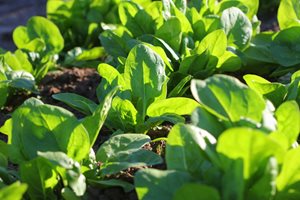
Spinach is a fast-growing, nutrient-packed leafy green that's easy to grow, particularly for those looking to add a healthy, homegrown touch to their meals. In this guide, we'll walk you through everything you need to know about how to grow spinach, including top tips and advice on bolting. Let's dive in!
How to plant spinach
Spinach thrives in cool, moist conditions, ideally between 15–20°C, making it a perfect plant to grow in the UK climate. It'll perform even better when grown in a polytunnel, where temperatures can be regulated. Here are some tips on getting started:
1. Prepare the Soil
Spinach grows best in fertile, well-drained soil to prevent waterlogging. Prepare your soil by incorporating organic matter like compost or well-rotted manure. Spinach prefers a soil pH between 6.0 and 7.5. Test the soil with a soil pH testing kit or digital pH meter before planting.
2. Sowing the Seeds
- Direct sowing: If you're unsure how far apart to plant spinach seeds when direct sowing, try to make shallow drills (1/4 or 1/2 inch deep) and space the seeds about 1-2 inches apart. Thin out plants later to leave around 6 inches between each one.
- Transplanting: Some people may find transplanting spinach difficult. But, if you prefer starting seeds in trays, transplant seedlings when they are hardened off and still small before a strong taproot has formed.
When to grow spinach
Spinach is a cool-weather crop, which makes it perfect for early spring or autumn planting. However, you can extend the growing season and prevent extreme temperature fluctuations by using a polytunnel.
- Early Spring (March-April): Plant your seeds early in spring, as spinach grows best before the summer heat sets in.
- Autumn (September-October): Spinach can also be planted in autumn for a later crop, and your polytunnel will offer added protection from the first frosts, ensuring a longer growing season.
How long does it take for spinach to grow?
Spinach is one of the fastest-growing vegetables, with most varieties ready to harvest in as little as 40-50 days.
- Baby spinach: Can be harvested as early as 20-35 days after sowing when leaves are small and tender.
- Mature spinach: Typically requires about 37-45 days to reach full size.
By planting spinach in succession every few weeks at regular interventions, as opposed to all at once, you can enjoy a steady supply of fresh leaves all season long.
Bolting
Bolting is when spinach prematurely goes to seed.
What causes spinach to bolt
What causes spinach to bolt is high temperatures (above 21°C) or stress, causing the leaves to become bitter and inedible.
You can spot a bolting spinach plant by looking for:
- Elongated stems
- Flower and seed production
- Bitter taste
- Pointed leaves
How to stop spinach bolting
Here are some tips on how to stop spinach bolting for as long as possible, especially when growing in a controlled environment like a polytunnel.
- Choose bolting-resistant varieties: Look for varieties that are slow-bolting or winter-hardy. Perpetual spinach, actually a variety of chard but with a similar taste to spinach, is much less likely to bolt in warmer conditions.
- Maintain cool temperatures: Spinach typically bolts when temperatures exceed 21°C. In your polytunnel, use proper ventilation and maintain shade to keep temperatures down during the warmer months.
- Regular watering: Ensure consistent moisture to avoid stress. Spinach doesn't like drying out, so keep the soil moist, particularly during dry spells. However, avoid overwatering, as spinach doesn't tolerate waterlogged soil.
- Harvest regularly: Pick spinach leaves early and often to encourage new growth and prevent the plant from diverting energy into flowering. If spinach isn't regularly harvested, it might sense that it has reached the end of its growing cycle and start producing flowers and seeds to reproduce.
How to grow spinach with Premier Polytunnels
A polytunnel helps maintain consistent growing conditions, allowing for quicker growth and a more reliable harvest of spinach. Our durable,
high-quality polytunnels provide the perfect environment for spinach, protecting it from the elements and extending your growing season.
In your polytunnel, the soil should be light, friable, and rich in nutrients. Raised beds within a polytunnel provide excellent drainage, making them ideal for spinach. If you're using a polytunnel, the sheltered, enclosed environment shields you from external weather fluctuations, giving you more control over soil conditions and temperature, ensuring optimal growth.
Our expert team is here to guide you in choosing the right products for your needs. If you have any questions, feel free to reach out to us at
01282 811250 or email:
info@premierpolytunnels.co.uk.